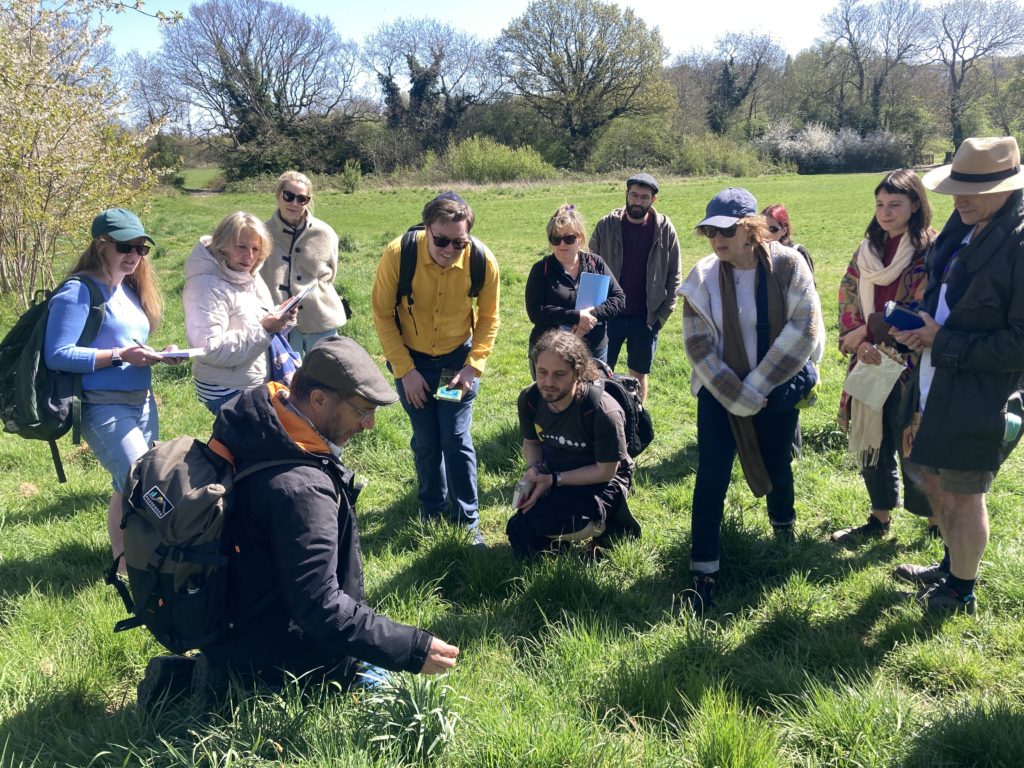We had a wonderful time at the Pre-Pesach forage, led by London National Park City Ranger, Michael from the London Funghus Network. During the event, we went on a ‘botanical safari’ of Hampstead Heath Extension.

While there has been a lot of focus on rewilding the environment, Michael explained how important it is to also rewild ourselves. One way to do this is through our diet, embracing the traditions of our ancestors in gathering wild foods.
Michael showed us at least 10 different edibles growing on the heath and taught us the dos and don’ts of foraging. For example, it’s important to only take from large populations of plants and ensure we don’t pull up the root, as doing so would prevent it from growing back. A big part of foraging is observing and making sure you know exactly what you’re picking—especially if you’re planning to eat it. Foraging teaches us to have a ‘light touch,’ to observe, and to leave no trace.
We learned that borscht was originally a green soup made from hogweed!
We also took part in the ‘nettle challenge,’ with Mike showing us the best way to pick nettle seeds and eat them raw without getting stung.
Throughout the session, we shared wild food recipe tips.
We discovered various wild foods that can be foraged for Pesach seder plates, such as dandelion and garlic mustard. However, with all these, it’s important to be aware of poisonous lookalikes, which is why wild food should only be consumed once the species has been 100% verified.
At the end, we sat down to enjoy nettle tea, Mike’s homemade three-cornered leek pesto, and wild food-foraged vegan flapjacks. Mike has kindly shared his recipes with us.
Three cornered leek pesto
Ingredients
150 grams of three cornered leek or other foraged edibles, such as nettles, wild garlic or a combination
50 grams of walnuts
6 tablespoons of olive oil
2 tablespoons of sunflower oil (or just olive oil)
Method
1. Roughly chop the herbs.
2. Place all the ingredients
Foraged flapjacks
Spice up your baking with a taste of the wild
Ingredients
- 250g oats
- 125g brown/demerara sugar
- 125g margarine
- A pinch of salt (optional)
- 1-2 tsp of wild spices/seeds (e.g. Nettle seeds; or common Hogweed or Alexanders have a tangy punch). You can substitute with shop-bought Golpar seeds (aka Persian Hogweed or Angelica).
Method
- Warm the margarine in a pan over a medium-low heat and add the sugar, stirring until it has melted, adding the spices at the end.
- Add the mixture and salt to the oats, stir thoroughly and leave to rest
- Line a baking tray with greaseproof paper and fill with the flapjack mixture, pressing it down into the corners
- Bake in the oven for 30 minutes at 200oC. Remove from the oven and once the flapjack has cooled and hardened, cut into slices and enjoy with a cup of Nettle tea!
Important
Wild food should only be consumed if the species has been 100% verified. Hogweed and Alexanders are part of the carrot family which includes poisonous species, and should only be consumed when identified by an experienced forager or botanist. Common Hogweed can be substituted with Golpar (Persian Hogweed) bought online or from international supermarkets.




















